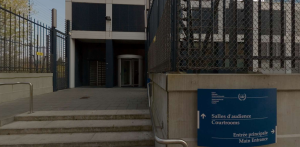
Liberian ex-president Charles Taylor’s appeal against his conviction for war crimes and crimes against humanity has been rejected. Last Thursday, the Special Court for Sierra Leon (SCSL), an independent tribunal established jointly by Sierra Leon and the United Nations, unanimously upheld Taylor’s convictions and 50-year sentence. [SCSL] The UN Security Council released a statement calling the decision “an important step in bringing to justice those individuals who bear the greatest responsibility.” [UN Security Council]
Taylor’s lawyers appealed on the grounds that legal errors occurred in the original trial. [BBC] The court rejected their argument. Taylor has no further recourse to challenge the decision and will serve his sentence in a foreign prison. Britain has agreed to house Taylor for the duration of his sentence, but Sweden, Finland, and Rwanda are also potential destinations for the former head of state. [Reuters]
In April 2012, the Special Court for Sierra Leon convicted Taylor of 11 counts of war crimes and crimes against humanity including rape, murder, terrorism, and the use of child soldiers, committed by Sierra Leonean rebel fighters – aided and abetted by Taylor – during the civil conflicts in Sierra Leone between 1996 and 2002. [BBC] A month later, the court sentenced him to 50 years. The Appeals Chamber found theis sentence to be “fair and reasonable in light of the circumstances.” [SCSL] Charles Taylor is the first head of state convicted of war crimes by an international tribunal since Karl Dönitz’s conviction at the Nuremberg Trials following World War II. [1] [Reuters]
Taylor was convicted for his actions during the violent civil war in Sierra Leone in the 1990s. The Court found that he supported the Revolutionary United Front (RUF) rebels despite awareness of the atrocities that they committed against the civilian population. While he did not command the forces, he shares in the criminal responsibility for the heinous acts the RUF committed with his assistance. [BBC] According to prosecutors, Taylor used blood diamonds from the conflict zone to finance activities including the purchase of weapons and ammunition. [Reuters; NY Times]
Taylor was the final individual to come before the SCSL, which was created solely to hear cases involving war crimes committed from 1996 to 2002 in Sierra Leone. [NY Times] The SCSL Prosecutor indicted thirteen people, including Sierra Leonean rebel commanders, and the trials of former leaders of the Armed Forces Revolutionary Council, Civil Defence Forces and Revolutionary United Front have been completed. [SCSL] With the completion of Taylor’s appellate proceeding, the SCSL will shut down and will be replaced by the Residual Special Court (RSC). The RSC will support witnesses and ensure that they are not harassed or threatened. [UN]
[1] Other heads of state have been prosecuted or convicted internationally for crimes against humanity and genocide, or have been convicted of war crimes in domestic proceedings. For example, former Serbian President, Slobodan Milošević was being prosecuted for war crimes and other charges by the International Criminal Tribunal for the Former Yugoslavia (ICTY) when he died in 2006, and Milan Babić, first President of the breakaway Republic of Serbian Krajina, admitted his guilt for war crimes and was sentenced by the ICTY.
